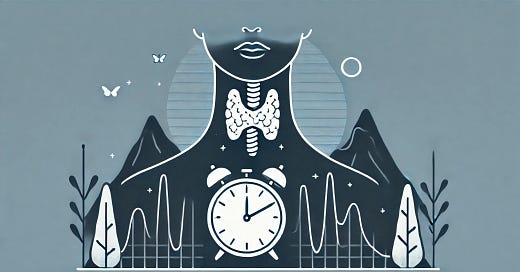Unveiling the Power of Your Thyroid and Circadian Rhythms
The Hidden Harmonies Keeping You Healthy
Ever wondered how your body manages all its complex functions like keeping your metabolism steady or making sure you wake up and sleep on a proper schedule. It’s all thanks to some incredibly intricate systems involving your thyroid gland and something known as the circadian rhythm.
Let's start with the thyroid gland first. Nestled in your neck, this one is a real powerhouse. It produces two key hormones: T4 (thyroxine) and T3 (triiodothyronine). These hormones are super important because they regulate your metabolism, help keep your body temperature stable, and ensure your cells develop properly. But these hormones don’t just pop up out of nowhere; their production is a finely tuned process initiated by the thyroid-stimulating hormone (TSH), which is controlled by the thyrotropin-releasing hormone (TRH) from the hypothalamus in your brain. This process is part of a feedback loop known as the hypothalamic-pituitary-thyroid (HPT) axis.
Think of it like a thermostat that regulates your home’s temperature, but instead, it’s regulating your body’s hormone levels. The thyroid hormones monitor the system and adjust the production of TSH and TRH, keeping everything in balance. It’s a brilliant example of your body’s checks and balances system working to maintain internal stability.
Moving on to another fascinating aspect of how our bodies keep time: circadian rhythms. These are essentially 24-hour cycles that are part of the body’s internal clock, running in the background to carry out essential functions and processes. These rhythms are observed in nearly every living creature and are deeply embedded in our biological setup.
Circadian rhythms help dictate your sleep patterns, feeding habits, hormone release, and other bodily functions. They’re why you might notice you feel energised in the morning but sleepy as the night draws in.
There's this tiny part of your brain called the suprachiasmatic nucleus, or SCN for short. It's in the hypothalamus, which is a fancy way of saying it's in a spot that controls a bunch of important stuff. These SCN cells are really sensitive to light and darkness.
Here’s how it works: when it’s daylight, the SCN tells your body to stay alert and active. Then, when it gets dark, the SCN sends out signals to start producing melatonin, which is a hormone that makes you feel sleepy. It’s like your body's way of saying, "Hey, it’s time to wind down!"
Think of it as your internal alarm clock, syncing you up with the day and night. When you wake up in the morning and see sunlight, your body gets the message that it’s time to start the day. And when it’s dark outside, your body knows it’s time to get ready for bed.
But it’s not just about sleeping and waking. Circadian rhythms influence important endocrine functions and metabolic processes. The synchronisation of these circadian rhythms allows your body to anticipate and adapt to changes in the environment, and they play a crucial role in your overall health. Disruptions to these rhythms (like those caused by jet lag or shift work, disrupted or late sleep cycle) can lead to a whole host of health issues, including sleep disorders, obesity, diabetes, and depression, highlighting just how crucial they are.
So, whether it’s the thyroid hormones ensuring your metabolism is humming along just right, or your circadian rhythm making sure you’re catching enough zzz’s, your body is equipped with some pretty sophisticated mechanisms. These systems not only keep things running smoothly but also help you adapt to changes, ensuring you feel your best no matter the time of day. It’s truly amazing how these invisible processes shape our everyday well-being, orchestrating everything from how we feel to how we function.






